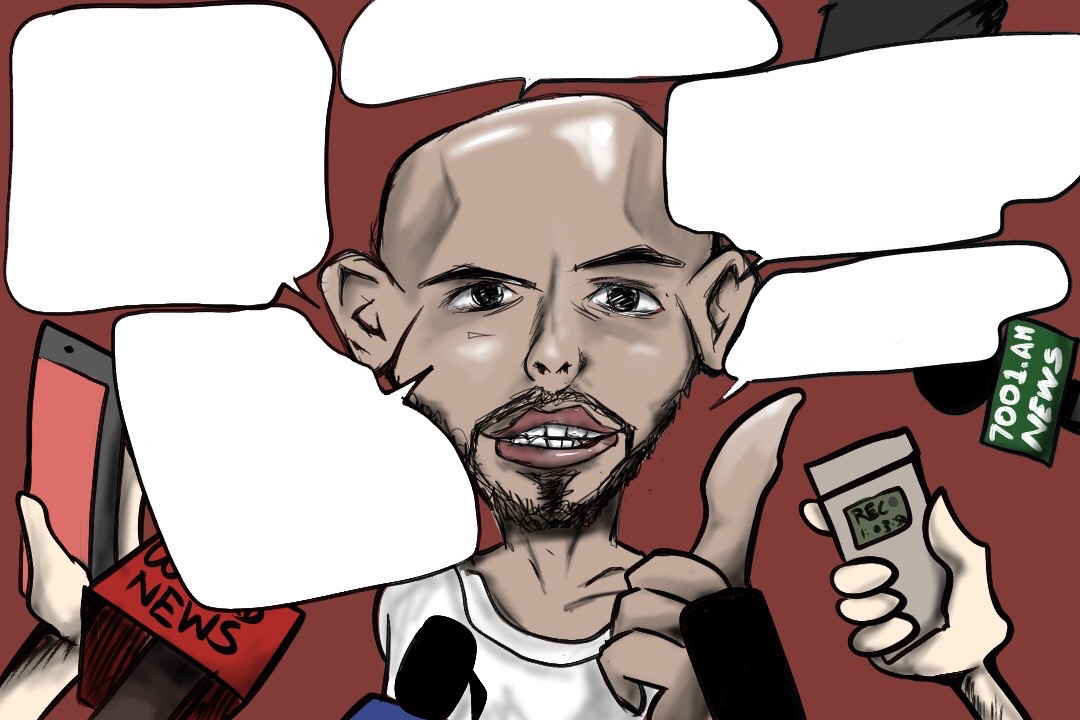He often endorses rape culture. He has admitted to scamming guys on the internet. When he’s not creating harmful content on social media, he frequently flaunts his yachts, Bugattis, and wealth. By now, you probably have an idea of who I am writing about.
Andrew Tate, a British-American influencer, rose to fame on apps like TikTok and Facebook. He started off as a professional kickboxer, TV producer, and reality television personality. However, due to his problematic content on social media, he has been penned by numerous newspapers as the “King of Toxic Masculinity.” Others on social media view Tate simply as the laughingstock of the internet. However, for his teenage fans, Tate is a god for teaching them the ways to be a “man.”
When I first heard of Andrew Tate’s antics, I thought he portrayed a character similar to comedian Sacha Baron-Cohen’s controversial Borat. At the time, Baron-Cohen’s content was mostly viewed as satirical. However, for today’s crowd, a man like Andrew Tate is being devoured by cancel culture. Despite many people writing off Tate and his views, his misogynistic and homophobic beliefs, including the use of anti-LGBT slurs, have still garnered him a massive and impressionable audience.
Tate’s viewers are both misogynistic men like him, as well as naive adolescent boys. His content is dangerous to these younger individuals because it might strongly influence them to adopt the misogynistic and racist views that he has expressed. Examples include how Tate has used racial slurs in his tweets and degraded women on his podcast for having “no innate responsibility or honor.”
Nevertheless, the central issue here is that it’s not the first time that we’re seeing popular figures with controversial beliefs and an impressionable audience. Since 2016, U of T professor emeritus Jordan B. Peterson gained notoriety for his controversial political beliefs. Peterson repeatedly refused to acknowledge the use of gender-neutral pronouns for transgender and non-binary people and claimed that having to acknowledge gender-neutral pronouns was an infringement on free speech.
Peterson serves as another example of a problematic man with insensitive ideals and an impressionable audience. As a professor, Peterson was in a position of power and as such, his statements and actions may have influenced the students at U of T. In the aftermath of a U of T rally on free speech that Peterson spoke at, multiple threats were made against trans and non-binary students on campus. It’s difficult not to see the damaging effect that controversial figures such as Peterson have on young individuals. Andrew Tate is no different.
Despite the disgusting character of Tate’s misogynistic and homophobic social media content, there are teenagers that still buy into his beliefs and seek to emulate him. I believe that popular figures with such dangerous platforms should be permanently prohibited from all social media in order to reduce the exposure of their content to more impressionable audiences.
Fortunately, in August of this year, Andrew Tate’s social media accounts were banned for good. Spokespeople for major platforms such as TikTok, Instagram, YouTube, and Facebook released statements on how Tate’s content violates community guidelines and company policies.
However, what I can’t seem to wrap my head around is why we continue to give people like him a platform. Why are people still attracted to misogynistic and sexist guys like Tate? Perhaps it is his transparency about his controversial beliefs, or the fact that even someone as despicable as him can be deemed “successful” in life.
In Tate’s defense, he states that he was portraying a “comedic character,” which, for him, was blown out of proportion by the public. He thus attempted to free himself of any fault or influence he had on his young viewers.
If he was really only playing a character, then his behaviour should have changed over time, while he was in the public eye. He could have clarified that he was mocking other misogynistic figures before his accounts were removed. He had an opportunity to put a disclaimer on his videos, posts, and websites that his content is not suitable for minors and should not be taken seriously. Yet, he did not do any of that, making his statement hard to believe.
Andrew Tate isn’t special, and thankfully his social media presence is diminished. A crowd is all that Tate and influencers like him need to make money. If not giving them that opportunity means that teenagers aren’t exposed anymore to the sexist and racist comments they make — not to mention the ones that I find downright stupid, such as claiming to be the world’s first trillionaire — then so be it. People like Tate don’t deserve fame or money, and they are not worth the spotlight at all.
Kyla Cassandra Cortez is a second year student at St. Michael’s College studying English and book & media studies.


